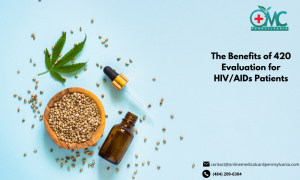
MMJ has been prescribed to AIDS patients since the early 1990s, and its benefits have been widely studied and reported on since that time. It can treat pain, nausea, depression, and more when comes to AIDS patients, so it’s clear that it can help many people deal with the effects of their disease—and its treatment—better than the current standard of care. Here are just some of the ways that it helps HIV/AIDS patients cope with their illness, their medications, and their life in general.
How is HIV Transmitted from Person to Person?
HIV is transmitted from person to person through unprotected sex, sharing needles, or contact with infected blood. The virus destroys the immune system of the body, leaving the affected person vulnerable to other, potentially fatal illnesses and infections. HIV cannot be cured, however, there are medicines that can add years to a person’s life. Antiretroviral drugs are taken by HIV-positive individuals to prevent the spread of the infection. With the use of these drugs, HIV-positive patients who maintain an undetectable viral load essentially have no danger of passing the infection to their partner (s). These drugs function best when taken as directed by a medical professional, along with safer sex behaviors including using condoms and restricting the number of partners. When taken properly, these medications also help prevent many serious health problems like heart disease and certain cancers.
HIV / AIDS Symptoms
The symptoms of HIV and AIDS can vary from person to person and include a wide range. They can range from mild to deadly, and include things like fever, weight loss, diarrhea, night sweats, fatigue, and sore throat. Some people may experience swollen lymph nodes in the neck or groin as well as chronic coughs. Other symptoms could be brought on by malignant tumors that arise in reaction to the virus itself. Opportunistic infections emerge as the immune system deteriorates. People living with HIV often have increased susceptibility to common illnesses because their immune systems are not functioning properly. Which means it can help them fight these illnesses by stimulating their appetite and boosting their energy levels.
HIV/AIDS & 420 Evaluation
It is a successful treatment for a number of illnesses, including HIV/AIDS. Many of the disease’s symptoms can be alleviated by its active components, known as cannabinoids. Using its natural cannabinoid characteristics, AIDS and cancer patients have seen relief from nausea, vomiting, and appetite loss. It is also used to relieve pain and stress which are often common among these patients. Many patients use it as a method to counteract the side effects of powerful medications such as AZT and protease inhibitors that can cause weight gain, insomnia, or mood swings.
It is important to note that it is illegal to use it if you are not a medical cardholder in Pennsylvania. You can get your medical card online by applying at Online Medical Card Pennsylvania, by following some simple steps.
Early Use of 420 Evaluation in HIV
If you are an online medical card holder, you can use your MMJ Card in Pennsylvania to treat HIV disease. Although it is beneficial for several health conditions, its use in HIV/AIDS patients is still somewhat controversial. Some studies have shown that early use of it can improve the immune system’s response to the virus. While other studies have shown that it can help relieve some of the symptoms associated with the disease. However, more research is needed to confirm these findings. In addition, some research has shown that when used by people who are not suffering from HIV or AIDS, MMJ can suppress the immune system and make it easier for an infection to take hold. It is important for any person considering using it for their condition to speak with their doctor before taking any steps.
Use in HIV-Associated Neuropathy
The capacity of MMJ to lessen neuropathic pain is one of the most frequently cited advantages for HIV/AIDS patients. Although it is frequently challenging to manage this kind of pain with conventional drugs, it can be done. In one study, AIDS patients who used it saw a significant reduction in their neuropathic pain levels. As such, they were able to decrease their use of opioids and other prescription drugs that are typically prescribed to combat chronic pain. Another study found that HIV-positive people who used it reported an increase in their quality of life. Over time compared to those who did not use it. Many other studies have concluded that it can effectively reduce symptoms associated with chronic nerve damage due to AIDS. As well as related illnesses like glaucoma and cancer.
Final Thoughts
Effective treatment for a number of illnesses, including HIV/AIDS, is 420 Evaluation Pennsylvania. It can help improve the quality of life for patients by reducing pain, nausea, and fatigue. Additionally, marijuana can increase appetite and help with weight gain. While more research is needed, medical marijuana is a promising treatment option for patients with HIV/AIDS.























![To Increase YouTube Subscribers Must Use These Service Provider [New]](https://businessleed.com/wp-content/uploads/2022/11/To-Increase-YouTube-Subscribers-Must-Use-These-Service-Provider-New-360x180.jpg)














